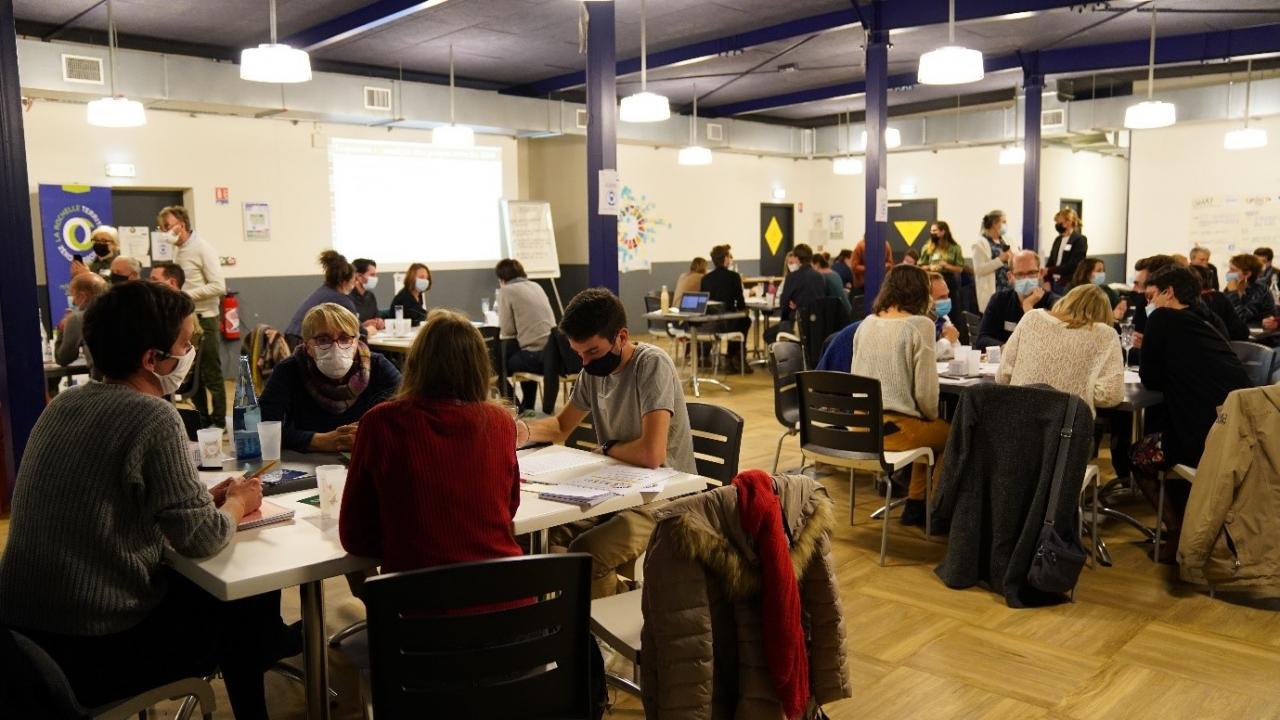
On 25 November, Stina Heikkilä had the opportunity to participate in an exciting event organised by our Global Goals for Cities partner La Rochelle Urban Community: the bi-annual Participatory Forum for Actors for Transition (Forum Participatif des Acteurs de la Transition). For this Forum, the team from La Rochelle Urban Community had planned an “SDG edition” with the aim of raising awareness about the 2030 Agenda and the SDGs among local stakeholders.
This article is written by the Global Goals for Cities Lead Expert Stina Heikkilä.
In this article, I capture some of the take-aways and practical tips for organising an awareness-raising event based on this experience. Since all Global Goals for Cities partners will organise at least two awareness-raising events during our network life, and since awareness-raising is a central aspect of SDG localisaton, this can be a useful resource for cities to come back to for inspiration.
Thanks to the local team for all the inputs!
Why raise awareness about the SDGs?
SDG localisation is typically summarised in four key steps, the first of which involves raising awareness about the SDGs and starting a participatory process, before going into more detailed agenda-setting, planning of actions, and monitoring and evaluation of progress.
But why is it so important to communicate and raise awareness about the SDGs?
URBACT expert Christophe Gouache put this well in our transnational meeting back in September 2021: “The future is too important to be left to politics and experts alone”.
The SDGs are part of our global future. Local actors therefore need to know what the SDGs are so that they can provide meaningful contributions to local agenda-setting and actions to achieve the goals. Unless people know what the global goals are about, it’s hard to create a sense of ownership at the local level, and to ensure accountability among decision-makers.
Allowing people to relate to the SDGs first-hand can help them reflect on changes they want to see in their city or territory, and what they can do in their everyday lives to contribute to such change. This is what the team from La Rochelle Urban Community set out to promote in the evening of 25 November.
Where to start?
One common challenge cities face when it comes to raising awareness of the SDGs is that the goals can be rather complex to explain. It can be hard for people to see why those global goals matter for their everyday lives. In addition, there are tonnes of communication materials and workshop tools out there to pick from.
The team from La Rochelle Urban Community decided to mix and match some different tools that fitted with the objectives of the Forum’s SDG edition: to make participants reflect personally on the goals and create a common culture around the SDGs, to get to know different actors’ contribution to the goals, and to use the SDGs as a framework to analyse and strengthen local projects carried out by some of the participants of the Forum.
These objectives meant that people could join the Forum without any prior knowledge about the SDGs. On the other hand, those who joined the Forum for the second or third time could learn more about the SDGs and how the goals link to the sustainable transition of the urban community.
Some of the tools used during the event were:
- “SDG cards” with the icon of the goal on the front and an explanation of the goal on the back. These printed and laminated to be able to reuse them in future events, then distributed on the tables for participants to study. Those cards came from the Walloon Region (BE), with the advantage of being created in French.
- Small “SDG cubes” made of paper cutouts highlighting some actions people can take to contribute towards the goals. Those came from a French libraries network engaged in the dissemination of the Agenda 2030.
- A booklet with the 17 SDGs and 169 targets printed out for each table.
- A giant SDG wheel on one of the walls to gather inputs from all participants (see more below).
Other visual elements included a previously created photo exhibition of the SDGs, as well as project posters relevant to the workshops help during the forum.
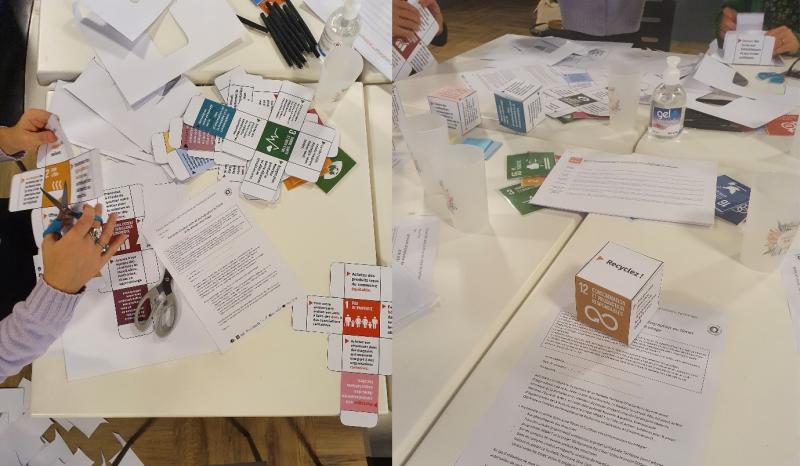
Several colleagues from La Rochelle Urban Community collaborated in the final preparations. Here preparing the “SDG Cubes” – one of the awareness-raising tools selected for the event.
The importance of being well-prepared
To make sure that preparations, facilitation and follow-up run smoothly, the team in La Rochelle were on top of some important practical things. First, they had asked people to sign up in advance. This is important not only to have an idea of how many participants to expect, to be able to prepare an attendees list, know who showed up, and to have contacts for follow-up communication. If the event is organised in a more open format (e.g. like a festival), collecting contacts from passers-by can be another idea.
For the Participatory Forum in La Rochelle, the team had set up a check-in stand where participants could get some more information from brochures and flyers from different projects, sign the participant list and get a name tag. Covid vaccine passes were checked before entering the venue. Several colleagues from the local administration had been mobilised to help!
At the Forum, there were no single use plastic items and only tap water was provided to the participants (before the cocktail hour) – a great way to “walk the talk” and show commitment to sustainability!
Another important formality is to have participants sign a form to agree (or not) to appear in photos from the evening, for example for social media or other communication channels.
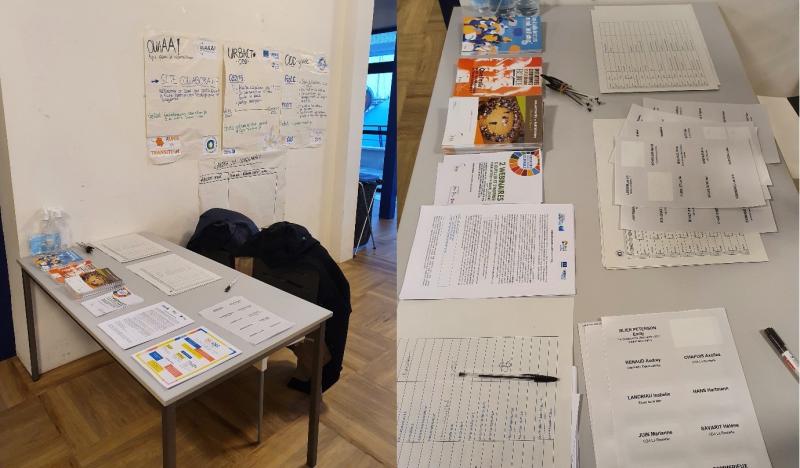
A well prepared welcome desk helps to keep track of who turns up and to collect contacts for follow-up communications.
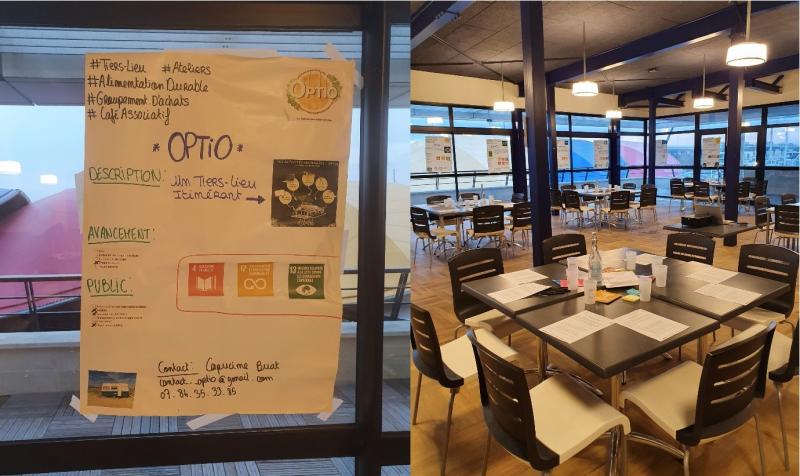
“Walking the talk” by providing tap water in re-usable cups gives a good impression for an event that is focussed on raising awareness about the SDGs.
Programme and facilitation
The evening was principally facilitated by Margaux Lambert, Citizen participation and change support project manager for La Rochelle Zero Carbon Territory project and Fanny Le Moal, project manager in l’IFREE two colleagues from La Rochelle Urban Community. Apart from planning the exercises, they were there to keep the exercises on track and make sure that the time-table was kept for each step.
Presentations: short and sweet
The Forum started by three very short presentations (15 minutes in total): the first one gave a brief overview of the 2030 Agenda and the SDGs, while the second one was by Delphine Gaudart-Brunet, European project manager and URBACT local coordinator, presenting the Global Goals for Cities network. The third presentation was by another initiative in La Rochelle Urban Community focussed on the SDGs, namely the project “ODD-yssée” implemented by the umbrella organisation “CAS” (Collectif Actions Solidaires) representing many small associations working towards a more equitable, inclusive and sustainable society.
Exercise 1: Individual reflections
The first exercise of the Forum asked participants to make an individual reflection of the SDGs. Everyone got an individual A4 print-out – “The SDGs and me” – with three key questions:
- What is the most important SDG for you?
- Which goal surprises you the most?
- Which one are you interested to follow up on more closely?
Once everyone around the table had answered the questions, each participant shared their reflections with the rest of the table. The fact that it is hard to pick one goal quickly led the discussion to how interlinked the goals are, and that some of them are even contradictory. Some participants felt like the SDGs are “old news” while others were impressed by the fact that they are part of an international agreement. Many of the people around the table where I sat picked SDG 13 as the most important SDG: take urgent action to combat climate change and its impacts.
The second individual reflection was to think about one thing that participants do to contribute to the SDGs on the territory, and one thing that they want to do to contribute more. Those ideas were put on post-its and shared on the giant wheel.
SDGs focussing on environmental topics were where most participants felt that they contribute, as can be seen in the photo below. This is likely a reflection of the fact that the Forum is part of the La Rochelle Zero Carbon Territory project. On the other hand, it shows the power of using the SDGs to raise awareness of sustainable urban development in all its dimensions.
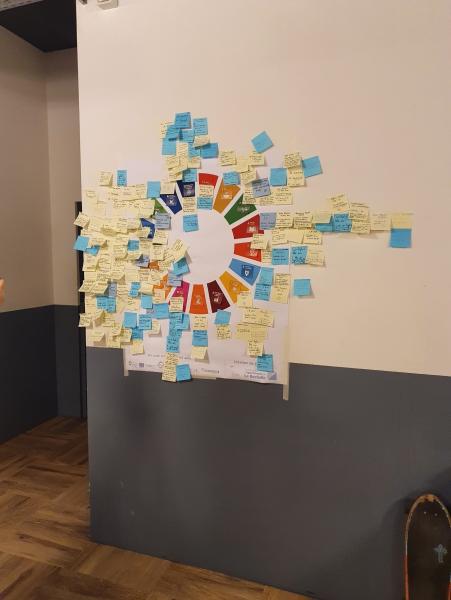
Participants put their ideas around how they currently contribute to the SDGs in the Urban Community of La Rochelle - and what they would like to do more - on the giant wheel next to the most relevant SDG.
The individual reflections were a good starting point for the evening to get everybody into thinking about a common “SDG culture”. Sometimes, we take for granted that everyone agrees with and know the SDGs, while in fact there is far from only one narrative at the local level when it comes to sustainable development. The SDGs can help to bring a shared language, while being a broad enough framework to fit with many visions.
Step 2: Group reflection around local projects
In the second part of the evening, participants were asked to select a project they would like to help analyse from an SDG perspective. A group of project owners (identified in a previous Forum) were there to present their projects and collect feedback from participants in relation to how the project contributes to the SDGs. Participants could choose which project to join for the discussion, but the facilitators asked everyone to be mindful of an even distribution of contributors across projects.
The project level analysis consisted in three main stages:
- Description of the project.
- Identifying positive, negative and neutral impacts of the project towards different SDGs and how to strengthen it to enhance its positive impacts.
- Visualisation of the results on an SDG wheel.
To carry out the analysis, participants used the tools at hand to analyse the SDGs, as well as a project sheet capturing key points from the discussion, and an SDG wheel to visualise the analysis.
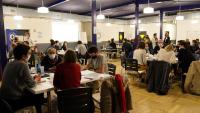
In the project analysis session, participants worked with project owners to analyse the project using the SDG framework. The goal was to identify how the project could be strengthened in its contribution to the SDGs.
Photo credit and copyright: Cécile Avril, Inprodtv
Again, the discussion was rich and diverse in terms of how different actors see their contribution and impact towards the SDGs. In the table I joined, the project owners for a project focussed on valorising food waste – ALTER Gaia - saw a clear contribution to SDG 8, in terms of generating meaningful economic activities on the territory. It was also clear that the exercise in this case helped the project owners to think more structurally about the goals of the project, from a societal point of view.
The project analysis step helped all participants to further appropriate the goals and gain more in-depth understanding of their scope and concrete targets. Applying the framework to a practical case helped this learning process.
Cocktail hour
The evening finished with a reception where participants could enjoy a drink and some locally sourced food while continuing the discussion. Many participants stayed until the stated closing time of the event – and discussions were both lively and passionate!
Follow-up and using the inputs from the Forum
Of course, organising an event to raise awareness about the SDGs is just the beginning of building a shared culture where the SDGs becomes embedded in territorial narratives and actions over time. The important work for the Urban Community of La Rochelle now becomes to synthesise and capitalise on the insights gathered from participants.
One week after the event, the organisers sent a follow-up communication, sharing the first results and materials used during the various workshop activities, as well as some photos from the evening. This is a really good practice in order not to lose momentum by letting participants forget about the event!
For the URBACT project, the inputs gathered from participants of the Forum will help to anchor the strategic vision for the Integrated Action Plan that will be co-created with the URBACT Local Group – a group that partly includes participants of the Forum, but is more limited in terms of number of participants, and more centred around the city and urban community concerns
“We thought a lot about how to position ourselves if participants from the Forum wanted to join the URBACT Local Group following the Forum”, Delphine Gaudart-Brunet explained, “We definitely see the value of having more interest in the project, yet we really want our ULG to be sustainable. Rather than an open call for more participants, we therefore try to include umbrella organisations on the one hand, and to work on a case-by-case basis on the other. What is important is to have several channels to reach out to people, so that if they are not in the ULG, this does not mean the door to participate is closed. That’s where the synergies with the Participatory Forum is so valuable”.
To sum up, organising an awareness-raising event takes quite a bit of time and effort, and needs careful planning in advance to choose the right tools and think through the facilitation of different steps, as well as the follow-up. The good thing is that the wheel does not have to be re-invented, and the Global Goals for Cities partners are full of ideas!
To read about other partners’ experiences, check out the below articles and videos from network partners:
- Trim, (IE) : “Raising awareness of the SDGs”
- Klaipeda (LE) Case Study: Virtual hackathon “Unlock SDGs”
- Mouscron’s (BE) work on the SDGs: https://www.youtube.com/watch?v=5AQ_12B3n4M
- Manresa’s (ES) work on the SDGs: https://www.youtube.com/watch?v=0z303pS9_EQ
Other inspiration can be found in a guide produced by the Flemish Association for Municipalities and Cities (VVSG): First volume and Second volume

